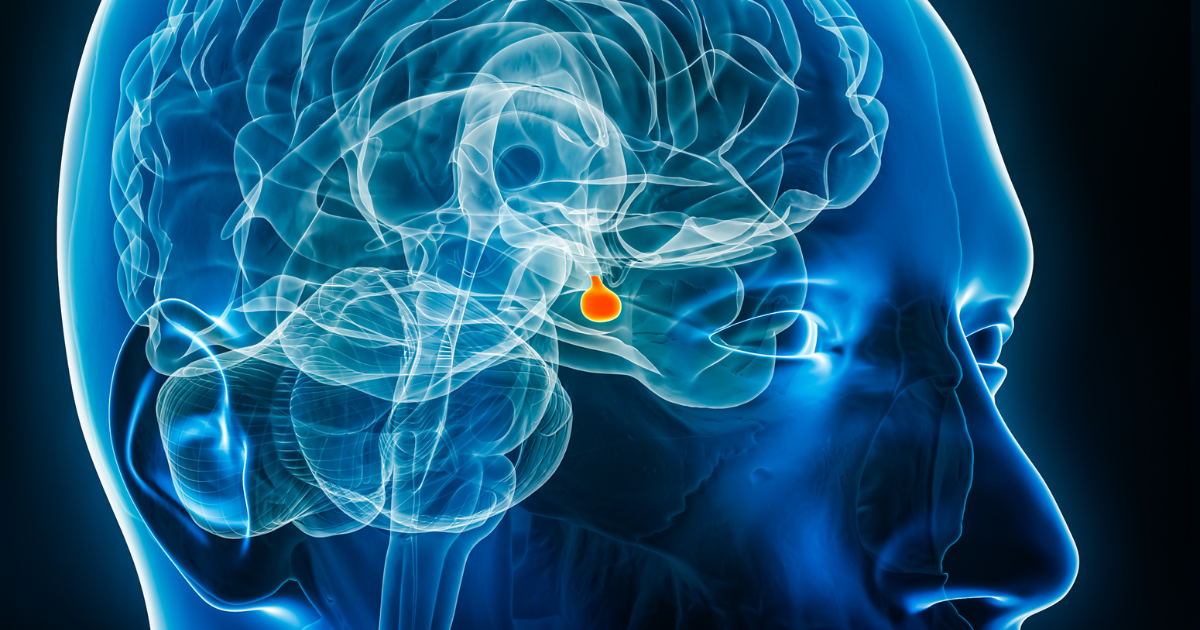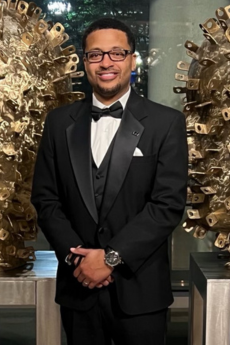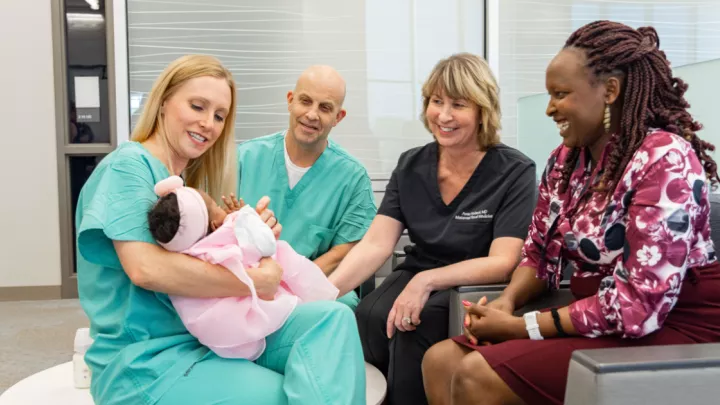A triumph of multidisciplinary care: Patient with pituitary gland tumor recovers eyesight with emergency surgery

On Monday, Oct. 23, 2023, Damon Strong was at work when he experienced what he described as the worst headache of his life. Before that, he didn’t remember having any symptoms other than a previous headache in August that had woke him up during the night.
“I let my wife know that my headache had returned and that I was going to the emergency room at Nebraska Medical Center,” says Damon. “My biggest fear was that something catastrophic would happen and no one would find me.”
Damon met his wife, Nebraska Medicine psychiatrist Sheritta Strong, MD, at the emergency room. Damon told the ER staff that he had a migraine, so they began treating him as they would a migraine patient. As his headache continued to worsen, Damon was eventually given fentanyl for the pain. Then, he was taken for an MRI. Pasha Lookian, MD, the neurosurgery resident on call, informed Damon that he had a mass the size of a racquetball surrounding his pituitary gland.
“My wife, Sheritta, was with me the whole time, reassuring me, talking to people and filling in those gaps,” says Damon. “She was great at keeping me calm. She was a lot calmer than I would’ve been had I been in her shoes.”
As Dr. Lookian was explaining the results of the MRI, Damon realized he’d lost vision in his left eye. “It had gone completely dark,” says Damon. “They were already going to admit me to the hospital. But when I lost my vision, they began immediately prepping me for emergency surgery.”
Leading Damon’s surgical team were neurosurgeon William Thorell, MD, and otolaryngologist Samuel Pate, MD. After surgery, Damon learned that the tumor had probably been there for years. When Damon opened his left eye after surgery, he was relieved to learn that his vision had returned.
Damon’s loss of vision was caused by the compression of the mass on the optic nerve. The goal of a surgery like Damon’s is not to remove the pituitary gland. It was to remove as much of the visible tumor and injured tissue as possible to restore vision.
After surgery, Damon spent four days recovering in the ICU before being transitioned to the Neurology unit, where he spent another two days under the care of his medical team.
Another critical member of Damon’s medical team is endocrinologist Andjela Drincic, MD. She and Dr. Thorell are part of a specialized multidisciplinary skull-based clinic at Nebraska Medical Center. The clinic treats complex malignant and benign tumors and other conditions located near the skull base involving the brain and the nerves that encompass hearing, facial expression, vision and balance.
Dr. Drincic explained the importance of the pituitary gland. “It’s a tiny gland located at the base of the brain, about the size of a pea, and yet it controls your entire body,” she says. “It regulates the hormonal activities of multiple crucial organs including the thyroid, adrenal, reproduction, growth and lactation.”
Some of the symptoms of hormonal loss and dysfunction include fatigue, not feeling good, loss of sexual desire and function, nausea and achiness. These symptoms are easy to brush off as being caused by stress or lack of sleep. As a result, patients often don’t seek medical care until a pituitary tumor is very large and causing bleeding or vision issues.
“The space where the pituitary gland is located is very limited, so any substantial sized mass can cause pressure on surrounding structures,” Dr. Drincic explains. “A tumor may cause hormonal problems, but people are not necessarily aware it exists until it grows large enough to affect their vision or causes bleeding, as in Damon’s case.”
“Damon had a catastrophic event, which he’s fortunate to have survived,” she continues. “He went to the emergency room with a severe headache and was found to have a bleed and vision loss and needed emergency surgery. What happened to him was extremely dangerous.”
Following his surgery, Damon has regular follow-up visits to monitor hormone levels and check scans for tumor regrowth. “When it comes to hormone replacement, one size does not fit all,” says Dr. Drincic. “We need to determine what’s perfect for that individual patient because the same number for you and me may not lead to the same level of symptom control. It matters how the patient feels. You must match that with the numbers.”
Now, nearly six months after surgery, Damon says his hormone levels have readjusted, and he’s no longer taking any medications. “I’m due for another blood draw soon to see where my levels are, but things are moving in the right direction,” he says.

Damon also continues to see another member of his health care team, ophthalmologist Ivey Thornton, MD. While his double vision has gone away, Damon remains sensitive to light, especially in his left eye. He wears special, light-blocking lenses all the time, even indoors. Outdoors he wears darker sunglasses because bright sunlight can cause headaches.
Damon appreciates how well the members of his medical team communicate with each other. “My doctors coordinate and talk with each other, and I don’t feel like a number,” says Damon. “Every visit I have with Dr. Drincic and Dr. Pate is at least 45 minutes to an hour long. The amount of detail and information they give and how much they care about their patients, I haven’t experienced that anywhere else.”
Damon’s recovery has been swift and steady. He was able to return to work part-time on Dec. 18 and has been full-time since around Christmas. Damon was completely cleared to return to normal activities, including gym workouts, by Dr. Pate in March.
“Damon has recovered quite a bit, but we’re still keeping a very close eye on him,” says Dr. Drincic. “What’s most important in these cases is having a team that’s skilled in treating this disease process. Damon really is in good hands. All his specialists are excellent. Our team knows each other and communicates well. We’re on speed dial with each other.”
While Damon admits that the experience was frightening at times, especially when he lost his vision, he’s thankful that he made it to Nebraska Medical Center that day. “When this happened, my family had just gotten back from a trip to Jamaica,” says Damon. “I don’t want to think about the outcome if it had happened a week earlier. God’s hand was not only on me but also on the surgeons, doctors and medical team that had a part in my treatment. They’re the reason I’m able to tell my story today.”







